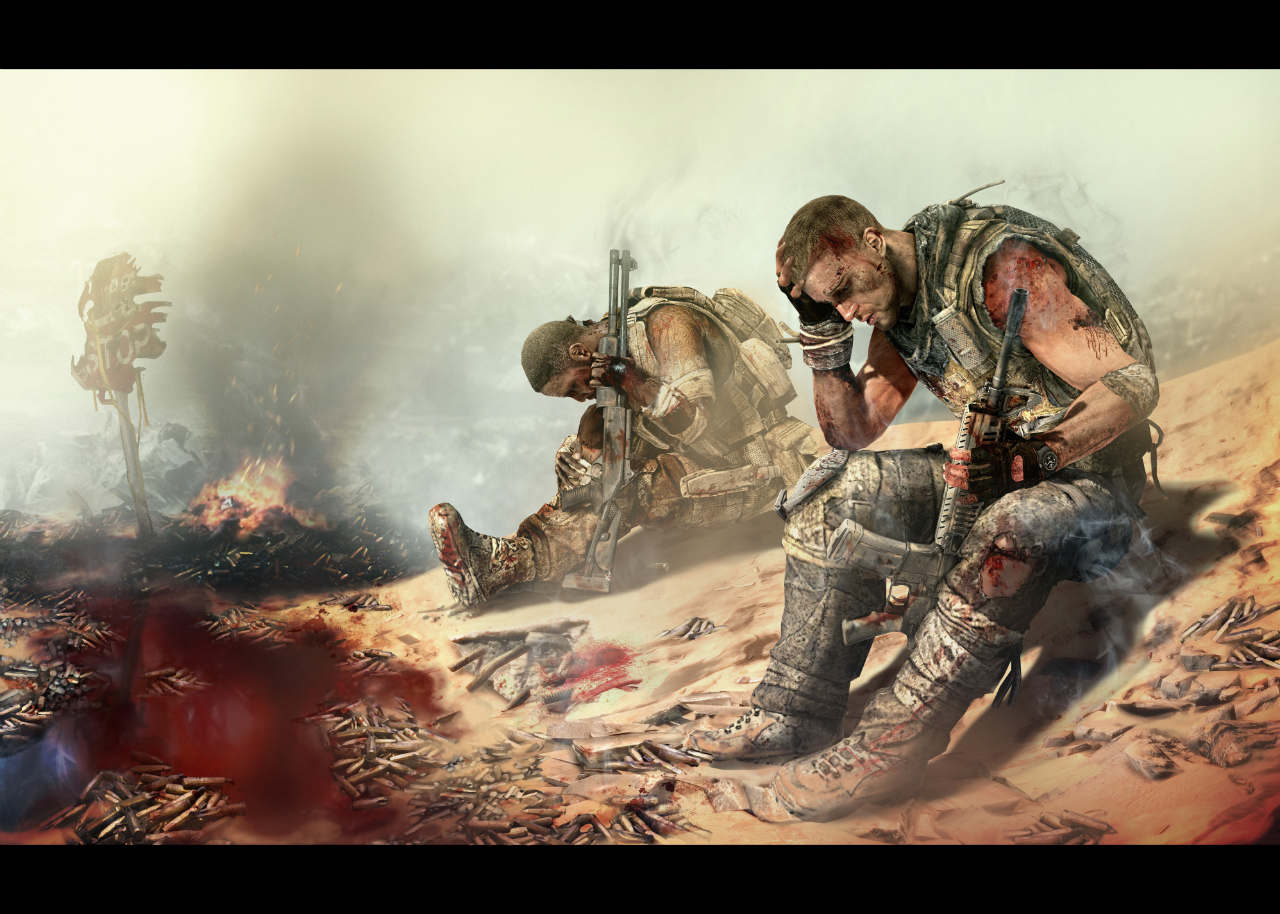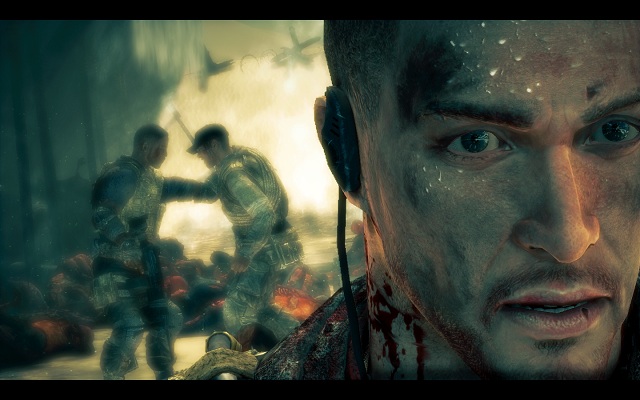Spec Ops: The Line
Note: This post contains SPOILERS! If you’re interested in this game, go play it first and then revisit this post.
Spec Ops: The Line plays much like a novella, like the Joseph Conrad tale to which it will always and inevitably be compared. It’s relatively short for a game, but delivers its message in a dense and potent gut-punch.
In The Line, near-future Dubai has been all but buried underneath catastrophic sandstorms that left the city’s inhabitants stranded. Colonel John Konrad of the 33rd Battalion volunteered himself and his troops to stay behind and help evacuate the city. You play Captain Martin Walker, leader of a three-man Delta Force squad sent to investigate Dubai after receiving a distress signal from Konrad. (For a more in-depth plot summary, the Wikipedia entry is good)
Naturally, the game has greater depth than this plot might imply. As Russ Pitts writes in Polygon’s great behind-the-scenes look:
It is a game about a city at risk of being swallowed by nature and a man at risk of being swallowed by the weight of his own horrible acts. It is a shooter in which the innocent bystanders are as much a part of the story as you are, and telling the good guys from the bad is practically impossible.
The game itself is a bit of an anomaly - it’s actually part of a franchise ( the Spec Ops franchise), which I’ve never played before, but I get the impression that this game’s development and evolution is quite unique from its sibling titles. It’s gameplay isn’t particularly sophisticated, even for shooters. In fact, it can feel quite frail at times - ammo is sparse, you die quickly, and the cover system is pretty wonky. Some take the stance that this less-than-gratiftying gameplay is intentional, and I have to agree. The game functions as much as a criticism on the shooter genre that glorifies war as much as it is on the brutality of war itself. The frightened look on Walker’s face as you’re on the brink of death was hard for me to ignore. An unlike other war-focused franchises (e.g. Call of Duty), you’re not fighting ambiguously Eastern European villains bent on destroying the world or unambiguously evil Middle Eastern terrorists set on bringing the west to its knees. You’re fighting fellow American soldiers and the twisted machinations of your own brittle, guilt-gnawed mind. That you’re fighting American soldiers manages to make the fact that you’re killing people more evident (foreign soldiers are easier to otherize). You mercilessly execute these soldiers for a pittance in much-needed ammunition - a drop of water in the desert - and you can often see the fear in their eyes as you do it. It can be a pretty jarring experience.
In spite of its subpar gameplay (or in addition to, if you interpret it like I do), The Line’s drawing of the narrative, and use of immersion and simple decision-making is so compelling that this game is hard to put down. There are only a few decision-making points in the game, but each is heavy, bearing solid ethical and moral ambiguities that can compel you to question your own sense of justice and belief in what’s right. For instance, the decision to either leave Riggs to suffer a slow painful death or mercifully kill him - Riggs having just damned the whole city to thirst - led to a discussion on justice in the modern age, tit-for-tat punishment, and the bitterness of post-massacre suicides. Games like this are powerful, and to me indicate the artistic potential of the medium.
The most important and most discussed event in The Line is the white phosphorus scene. In this scene, Walker makes the call (the player has no say) to blanket an entrenched group of the 33rd with white phosphorus, believing that they took a large group of refugees hostage. After the troops had been cleared, Walker and his squad find amongst the devastation that what they thought to be a cluster of enemy combatants was actually the refugees they were looking for, now charred and blackened from the white phosphorus.
It’s easy to be critical about the forced hand here. But technically, it’s hard to be truly critical about it - making an event so crucial to the plot optional would possibly mean spinning out a completely different alternate plot. Which would be neat, but maybe impractical for this game, and against its intent. But perhaps that this pivotal moment is without choice is what makes decisions so much more powerful afterwards. Walker, to cope with his crime, begins to posit imaginary decisions - such as the two hanging criminals - in the hopes of offering himself an opportunity at redemption, a chance to make the right choice. But ultimately, and tragically, he still denies himself from the most important decision he has - to leave Dubai and save his squad, or to ruthlessly press on deeper into the city and his madness.
In general, however, the game has a lot of great touches that maybe deserve greater analysis. The deeper you descend into Walker’s tragic deceit, the innocuous loading screen tips give way to dark and doubtful introspection - a glimpse at the player’s own lucidity that tunnel-visioned Walker does not have the benefit of. During the white phosphorus sequence, the sense of calm on Walker’s reflected face is startling and disturbing on a second playthrough, knowing what he’s actually doing on that monitor. It could be interesting to think about the decision to do an over-the-shoulder shooter rather than a first-person shooter like Call of Duty or Battlefield. At first thought, it seems to me that an FPS could have made the gameplay even more immersive, but it might have been equally important to see Walker’s expressions as he fought.But these are all opinions of someone who has been fortunate enough to never have seen real war firsthand. What would a real soldier think of The Line? Game critic Kris Ligman had a friend, a Marine that served two tours in Iraq, give his thoughts on the game during two playthroughs. Both his takes are worth a read.
In the first take he points out issues in general with games that implement decision-making systems. He also figures out the twist early on (and to be honest, it is a maybe overused plot device) - if I’d figured it out that early, I think that would have ruined a lot of the weight of the decisions that followed. They would have felt arbitrary and meaningless, as it would be apparent that Walker was careening toward his own inevitable destruction. For this game to be successful, the player needs to be as much in the dark as Walker - Walker, in his state after the white phosphorus incident, is mentally incapable of seeing the truth of his situation. You - the player - have to think you’re doing the sensible, rational thing just as much as Walker does, so that your realization of (self-)deception is just as damning as Walker’s. According to Walt Williams, lead writer of the game, one of your final choices is to just stop playing (that is, to let your Konrad hallucination count to five and kill you). In this light, this choice can be interpreted in a lot of ways - Walker finally giving up, or the player refusing to cross his or her “line” and play along with these disturbing decisions.
The second take seems to mostly be concerned with technical inaccuracies (there seem to be quite a few), but his reflection/summary at the end is a good look at the game in the context of today’s American conflicts, and the nature of heroism:“This [cognitive] dissonance arises from the idea that everyone is the hero of their own story. No one truly believes themselves to be the villain. This game makes you the villain.”
This observation points out The Line’s sharpest criticism of similar war games, and perhaps of human nature in general. In other war titles, it’s always a given that the player is the hero. But is that a reasonable assumption to make? As the “hero”, you’re killing countless amounts of people, and these games often fail to put such acts under sufficient ethical scrutiny. And in our own lives, how many of us fall victim to the blind conviction of our own actions, believing them to be unambiguously justified, assuming that we’d do no wrong (because if it were wrong, we wouldn’t do it)?

